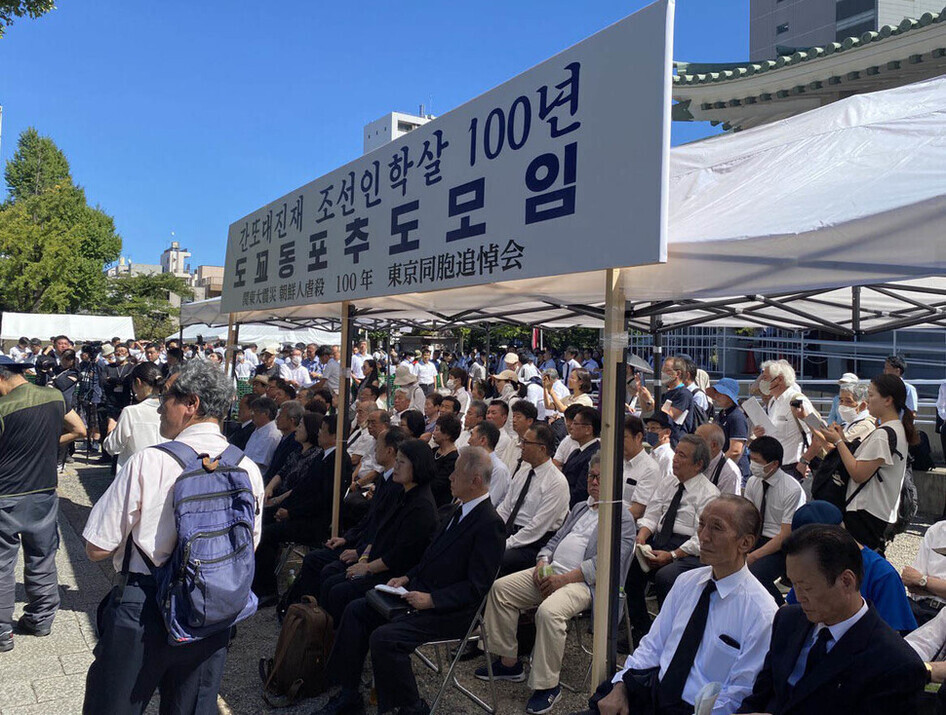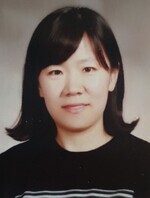hankyoreh
Links to other country sites 다른 나라 사이트 링크
[Correspondent’s column] The tragedy of ideological politicking over Chongryon


On Sept. 1, the 100th anniversary of the massacres of Koreans in the wake of the Great Kanto Earthquake, the voices of hundreds of Korean and Japanese citizens rang out in the heart of Tokyo as they rallied to demand an investigation and apology from the Japanese government. But these calls were soon drowned out by controversy over ideological purity testing.
My heart broke to hear the cries of people who lost family in the massacre, like 63-year-old Cho Kwang-hwan, who made the trek all the way to Tokyo to call on the Japanese government to “take action so that our wounds may heal,” go unheard.
Controversy first began to brew when South Korean National Assembly member Yoon Mee-hyang attended a memorial gathering in Tokyo for the centennial of the Kanto massacres, co-organized by the General Association of Korean Residents in Japan, known also as Chongryon, in collaboration with Japanese civic organizations Friday afternoon.
Conservative media began to question why a South Korean lawmaker would attend an event organized by a pro-North Korean organization, leading President Yoon Suk-yeol to go so far as to label her behavior as “anti-state.”
The central headquarters of the South Korea-affiliated Korean Residents Union in Japan, or Mindan, issued a statement on Monday calling for Yoon Mee-hyang to resign from her position in parliament and urging authorities to “thoroughly investigate her links to anti-state forces.”
This statement from Mindan immediately struck me as strange. Another memorial was held on Friday in Saitama, another area where Koreans were slaughtered in 1923. Three basic municipalities in Saitama — Honjo City, Kamisato Town, and Kumagaya City — organized various memorial services for Korean victims of the massacre at different times, which were attended by regional representatives of both Mindan and Chongryon.
“Both representatives expressed their gratitude to the municipal government and their officials for continuing the memorial service,” the Asahi Shimbun reported on Saturday, “and expressed their hope that the lessons of this painful history not be forgotten, but carried down the line in Japan and both Koreas.”
It makes me wonder how Mindan will explain why representatives of its local branches were fraternizing with such “anti-state forces.”
Zainichi society is no monolith. When pursuing historical issues between Korea and Japan — Japan’s exploitation of Koreans as forced labor, the Japanese military’s “comfort women” system of sexual slavery, the Kanto massacres, and Korean victims of the atomic bombing — there’s no avoiding Chongryon.
As an organization, it has fiercely fought Japan on behalf of Koreans that have suffered. Unfortunately, Mindan and Chongryon have often been unable to commiserate over shared hardships due to ideological conflicts caused by the division of North and South Korea.
Changing times, including the democratization of South Korea and the end of the Cold War, have had major ramifications for Korean compatriots in Japan. Since the late 1980s, the number of so-called “newcomers” who come to Japan from Korea to study or work has rapidly grown.
Started in 1990, the “One Korea Festival,” which unites Koreans across ideological lines and cultures, is attended by Mindan, Chongryon and “newcomers.”
The sort of red-baiting and ideological framing we’re seeing now in regard to Chongryon is also a source of discrimination, exclusion, and racism directed at Koreans in Japan.
A far-right group known as Zaitokukai — “Association of Citizens against the Special Privileges of the Zainichi” — notorious for its vehement anti-Korean views has staged demonstrations against Chosen gakko (Korean schools), calling them “schools that kidnap Japanese people” and saying they should be “abolished.” The group was recently found guilty of defamation in court. In 2020, during the COVID-19 pandemic, the shortage of masks became so severe that Saitama Prefecture organized a plan to distribute stockpiled masks to educational institutions, but excluded only Korean kindergartens. Fuji Corp., a real estate company, circulated documents internally that called Koreans “a lying people” for over two and a half years. People who have appeared in internet broadcasts for cosmetic firm DHC have spewed horrible anti-Korean slurs.
Discrimination against and antipathy directed at Koreans was one of the root causes of the atrocity 100 years ago, when Koreans were slaughtered in the wake of the Great Kanto Earthquake. Are we failing to learn from history?
Please direct questions or comments to [english@hani.co.kr]

Editorial・opinion
![[Editorial] Perilous stakes of Trump’s rhetoric around US troop pullout from Korea [Editorial] Perilous stakes of Trump’s rhetoric around US troop pullout from Korea](https://flexible.img.hani.co.kr/flexible/normal/500/300/imgdb/original/2024/0509/221715238827911.jpg) [Editorial] Perilous stakes of Trump’s rhetoric around US troop pullout from Korea
[Editorial] Perilous stakes of Trump’s rhetoric around US troop pullout from Korea![[Guest essay] Preventing Korean Peninsula from becoming front line of new cold war [Guest essay] Preventing Korean Peninsula from becoming front line of new cold war](https://flexible.img.hani.co.kr/flexible/normal/500/300/imgdb/original/2024/0507/7217150679227807.jpg) [Guest essay] Preventing Korean Peninsula from becoming front line of new cold war
[Guest essay] Preventing Korean Peninsula from becoming front line of new cold war- [Column] The state is back — but is it in business?
- [Column] Life on our Trisolaris
- [Editorial] Penalties for airing allegations against Korea’s first lady endanger free press
- [Editorial] Yoon must halt procurement of SM-3 interceptor missiles
- [Guest essay] Maybe Korea’s rapid population decline is an opportunity, not a crisis
- [Column] Can Yoon steer diplomacy with Russia, China back on track?
- [Column] Season 2 of special prosecutor probe may be coming to Korea soon
- [Column] Park Geun-hye déjà vu in Yoon Suk-yeol
Most viewed articles
- 1‘Free Palestine!’: Anti-war protest wave comes to Korean campuses
- 2[Editorial] Perilous stakes of Trump’s rhetoric around US troop pullout from Korea
- 360% of young Koreans see no need to have kids after marriage
- 4Korean president’s jailed mother-in-law approved for parole
- 5In Yoon’s Korea, a government ‘of, by and for prosecutors,’ says civic group
- 6Nuclear South Korea? The hidden implication of hints at US troop withdrawal
- 7[Photo] ‘End the genocide in Gaza’: Students in Korea join global anti-war protest wave
- 8Behind-the-times gender change regulations leave trans Koreans in the lurch
- 9Korea likely to shave off 1 trillion won from Indonesia’s KF-21 contribution price tag
- 10Yoon’s revival of civil affairs senior secretary criticized as shield against judicial scrutiny